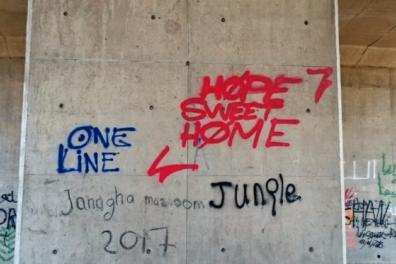Project LIMINAL, a project deployed in emergency international migration situations

Backed by its multidisciplinary team and innovative methodology for studying current migrations, linguistic and cultural mediations and interactions between migrants and institutional and associative players, LIMINAL has been rolling out several projects since November 2017. The program is funded by the Agence nationale de la Recherche (AnR) and supported by three laboratories at Inalco (Cessma, Cerlom, Plidam).
Three major areas are regularly investigated. The first is Hauts-de-France and in particular Calaisis, including the Calais and Grande Synthe camps. LIMINAL works there in partnership with several associations (notably Secours catholique and Plateforme Service Migrants) and directly with exiled populations "in transit". The latter, following the dismantling of the Calais "jungle" in October 2016 and with the authorities stiffening their stance in favor of non-settlement, are seeing their situation deteriorate. This affects field conditions and interactions, and calls for both methodological and theoretical questioning of the positioning of actors, starting with researchers, in the face of exile. The second fieldwork of LIMINAL concerns the Provence-Alpes-Côte d'Azur region (Briançon, Nice, Roya valley, Marseille, Ventimiglia), in partnership with Caritas and Médecins du monde. In Ventimiglia, the problems of the border zone define another "emergency situation" and a specific temporality. The third field is the Paris region, with a significant presence of the LIMINAL team at the La Chapelle temporary reception center between November and March 2018, when it closed. Under an agreement with Emmaüs Solidarité, LIMINAL had the opportunity to document interactions and mediations in the center over a long period, to interview all staff, including professional interpreters but also translators.
Continued fieldwork organized by the socio-anthropological axis on interactions (dir. MC Saglio-Yatzimirsky and A. Galitzine-Loumpet) in reception centers and on camps (Millénaire in Aubervilliers, for example) with pairs bringing together anthropologist and sociolinguist are building several projects with a strong social impact. The first is a lexico-terminological database on the vocabulary of migration in emergency situations. To this end, the language speakers of LIMINAL are undertaking the systematic collection of terms from the asylum procedure and the journey. The digital axis of LIMINAL (dir. P. Stockinger) in collaboration with the sociolinguistic axis (dir. A. Moghani) plans to develop this directory with a conceptual terminological approach.
A project to standardize and centralize welcome booklets for exiles in France is underway, with the aim of creating a future platform (or application) translated into the most widely used migrant languages. In this case it involves translations into languages absent from the welcome booklets and work on the language level to adapt legal vocabulary that is often too specialized and illegible by exiles. LIMINAL is also building an audiovisual database on interaction and mediation situations, based on interviews filmed in the La Chapelle center. These are translated (Amharic, Tigrinya, Arabic, Pashto, Dari, Peul, etc.) and then analyzed by sociolinguists and anthropologists from LIMINAL to propose tools for translation and mediation professionals. Filming exiles poses particular ethical questions, and similarly, working with sensitive and politicized data requires quite specific reflection on the disclosure of research data. Aware of these issues, LIMINAL constructs an adapted methodology as the fieldwork progresses.
LIMINAL disseminates its research, both in the form of online productions (Inalco doctoral seminar bringing together researchers, interpreters, mediators, colloquia including the May 28-29, 2018, Violence and Narrative -LIMINAL-Cessma, v. the article in Le Monde "Les réfugiés au défi de la preuve" 06.06.2018) as well as publications (v. Journal des Anthropologues, "Les subjectivités face à l'exil" (forthcoming 2018) co-edited by A. Galitzine-Loumpet and MC Saglio-Yatzimirsky, funded by the CS of Inalco-Cessma and LIMINAL) and working papers. LIMINAL also addresses a wider audience to alert around the issue of contemporary migrations and has opened the blog AZIL, langues, migration, exil (http://azil.blog.lemonde.fr), powered by team members.
LIMINAL is also working on a major publications project, under the coordination of A. Galitzine-Loumpet, based on the inscriptions (texts, drawings, graffiti) left by the "hébergés" systematically collected in the rooms of the La Chapelle Center: more than 2,000 photos make up an exceptional corpus, never before studied, for understanding situations of exile and the play on languages. They are currently being catalogued and published as part of a project on the writing of exile. It is likely that this scriptural analysis will form part of a wider project, as inscriptions have been spotted in other places along migratory routes (e.g. Ventimiglia).
Finally LIMINAL is working on the constitution of tutorials around the function of interpreter-mediator and envisages from the start of the 2019 academic year a new university diploma (DE Inalco, coord. A. Moghani) which would train interpreter-mediators in intercultural situations and in the languages of the field.
Marie-Caroline Saglio-Yatzimirsky
Research notebook: https://liminal.hypotheses.org
Facebook page: https://www.facebook.com/Anr-Liminal
AZIL blog, languages, migration, exile: http://azil.blog.lemonde.fr